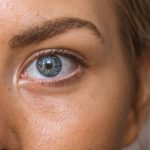Makeup Safety Tips and How to Protect Your Eyes
You don’t have to compromise your eye health for beauty. Many of our patients love to enhance the beauty of their eyes with cosmetics, but they don’t want to risk their vision or health. If you choose to wear cosmetics, we hope these eye makeup safety tips help you stay safe while looking your best.
Why Take Extra Care When Using Cosmetics Around The Eyes
People most often apply cosmetics to the skin around their eyes and their eyelashes. If you do so, always remember that the skin around your eyes is more delicate than the skin on other parts of your face and body. Therefore, you always want to treat this skin gently and use cosmetic products that do not cause irritation or infection. Use gentle application techniques such as a clean cosmetic brush or sponge and avoid tugging or rubbing the skin. Also take care not to get foundation, concealer, sunscreen, or other cosmetics in the eyes. Always apply the best eye skin care products to make your skin healthy.
Mascara is one of the most popular cosmetics as many women long for long lashes. Always be gentle with your eyelashes just like you are when handling the softer skin around the eyes. Your lashes help protect your eyes from dust, debris, or from drying out.
Potential Issues to Avoid When Using Cosmetics Around The Eyes
The following eye makeup safety tips are intended to prevent or minimize issues caused by infection, allergic reactions, and injuries to the eyes.
How To Prevent Infection From Eye Makeup
Sometimes dangerous bacteria or fungi may grow cosmetic products. Infection may result in itchy, puffy, inflamed or irritated eyes. In some cases, the infection may even cause long-term damage or vision loss. Conjunctivitis is one of the more common types of infection that may be caused by cosmetics. Good hygiene and a few careful techniques minimize the risk of developing an infection caused by cosmetics.
Be careful with cosmetics you intend to apply near the eyes to minimize the risk of potential infection. First, be aware that bacteria may grow in liquid and creamy textured eye makeup. This bacteria is less likely to thrive in powder-based eye makeup, but you still want to exercise caution. Whenever using liquid eye makeup like concealer, liquid eyeliner, or mascara take the following precautions:
- Do not use eye makeup longer than suggested guidelines indicate. For example, replace mascara every three months.
- It is easy to forget when you purchased a tube of mascara or eyeliner. Consider writing the purchase date on the package to remind you.
- Discard dried-up mascara, do not try to rehydrate it with saliva or other liquids.
- Avoid sharing mascara with other people to decrease the risk of sharing bacteria. Also, avoid using sample cosmetics from stores.
- If you develop an eye infection, discard any eye makeup you were using. Also, wait until healed before using new eye makeup.
- Contact your medical professional about any potential eye inflections and follow any advice or treatment plan.
- If you wear contact lenses, carefully follow hygiene guidance and any instructions your optometrist provides about using eye makeup while using contact lenses.
According to the FDA, the preservatives used in eye makeup are more likely to deteriorate at temperatures above 85 ̊F. Always store cosmetics at lower temperatures to minimize risk.
Dealing With Allergic Reactions To Eye Makeup
Reputable cosmetic companies carefully formulate eye makeup and avoid ingredients that are known to be harmful. However, some people have allergies and sensitivities to ingredients that are usually safe. If you notice itching, burning, or irritation after using a cosmetic product, discontinue use.
Some common cosmetic allergens include nickel, iron oxide, preservative ingredients and perfumes. Read ingredient lists to avoid the most common allergens if you have sensitivities. Manufacturers use these more in makeup not intended for use around the eye, so be sure to avoid using cosmetics intended for other areas such as lipstick near the eyes. Try introducing just one new eye makeup product at a time. This way it is easier to identify which products that you are reacting to.
Finally, discuss any reactions with a medical professional, in some cases, your doctor may want to perform an examination to rule out injury or illness.
Preventing Injury From Eye Makeup Use
Even when using appropriate products, injury is a risk. Always apply mascara and other eye makeup with a steady hand. Be careful to avoid scratching, scraping, or poking your eyes. Corneal abrasions are one type of mechanical injury that the wrong cosmetics or techniques may cause. Follow these guidelines to help prevent injury:
- Do not apply makeup while driving or riding in a moving vehicle
- Avoid using sharp objects to separate eyelashes that are clumped together
- Be very careful if you wear sparkly, shiny, or glittery eye shadow. Avoid using metallic glitter near the eyes.
- Do not apply eye makeup if you are intoxicated, overly tired or your hands are shaking. Be especially careful of mascara and eyeliner.
- Only apply eyeliner and eyeshadow outside the eyelid and not to your inner eyelid. Avoid using Kohl on your inner eyelids as well.
More Makeup Safety Tips: Removing Eye Makeup Safely
Always remove eye makeup before bedtime. This is one of the most important eye makeup safety tips. Mascara can stick to the lashes, clog up tear ducts or flake off into your eyes.
- As mentioned earlier, always be gentle with your eyelashes and the skin around your eyes. Gently remove eye makeup using a soft touch, in other words avoid vigorous scrubbing or scraping.
- Use mild eye makeup removers like a cleanser formulated for around the eyes, You can use Vaseline, or baby shampoo to remove cosmetics around the eyes. Be careful not to get the cleanser in your eyes. And thoroughly rinse the residue off.
We hope these makeup safety tips will help you stay safe while enjoying fashion and beauty. If you are a parent of preteens or teenagers, take the time to educate them about using cosmetics safely. Sometimes teens develop unhealthy habits that put their eyes at risk.
If you ever have any questions or concerns about your eye health, contact your optometrist. If you live in the Charlotte area, Piedmont Eyecare Associates are trusted professionals. Feel free to ask any questions during your next comprehensive eye examination. Contact us today to schedule your appointment.





